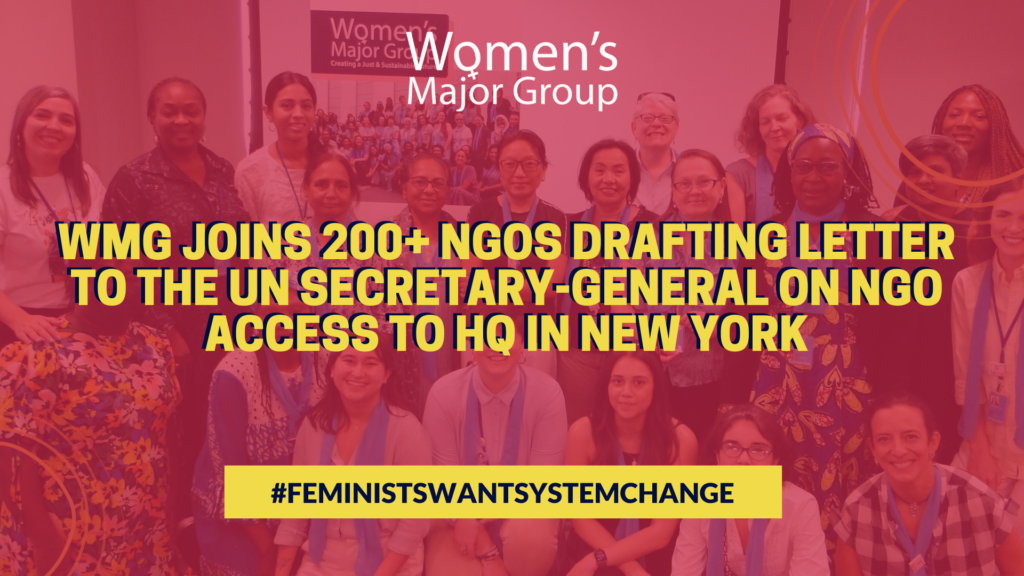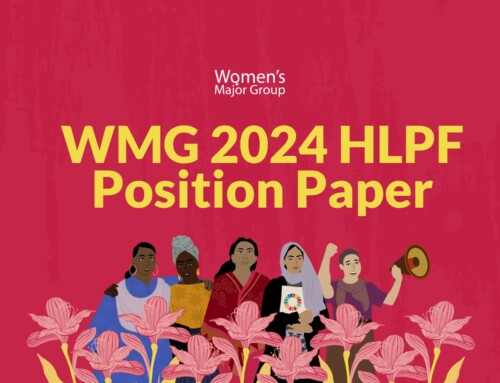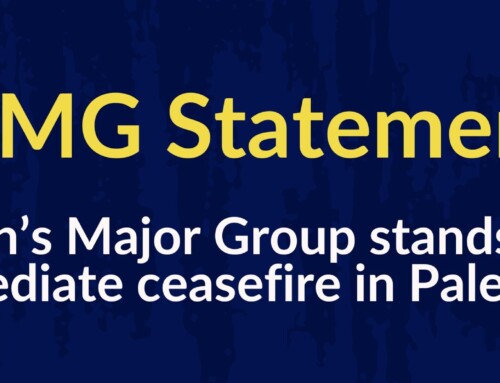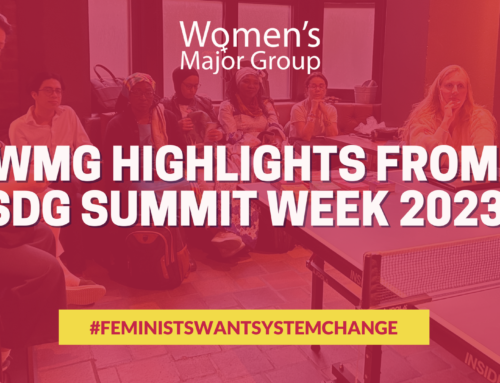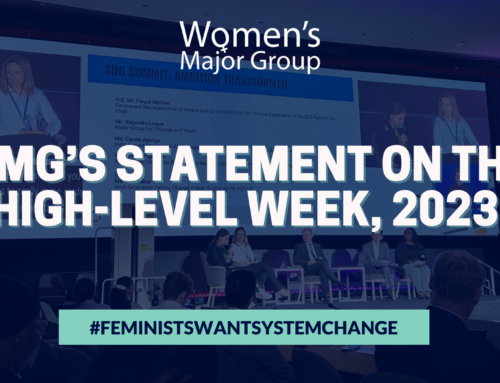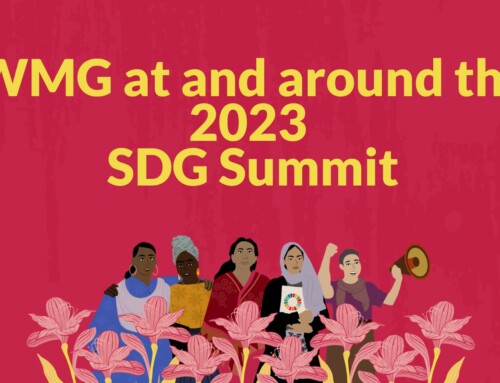WMG recently joined hands with more than 200 NGOs in drafting a letter to the UN Secretary-General (UNSG) raising concerns surrounding NGO access to the UN Head Quarters in New York. The collective efforts have resulted in the number of passes given to Civil Society Organizations (in ECOSOC Consultative status with the UN) being restored to pre-pandemic numbers, for access to the UNHQ during HLPF 2022.
The letter sent to the UNSG can be read below. The response received from the Secretary General can be found here.
—
H.E. Mr. António Guterres
United Nations Secretary-General
Your Excellency,
On Monday, April 25, after two years of emergency functioning due to the pandemic, the UN headquarters in New York opened its doors to visitors, participants in catered and special events, and guests of Missions and UN staff. We are happy to learn that the UN Headquarters are teeming with activities in these times when multilateralism is so badly needed.
Yet, as members of NGOs in consultative status with the UN we are very frustrated to learn that our own access is limited. Only two annual passes are being issued for each organization, plus one reserved for the CEO of the entity. This is a dramatic reduction from the earlier “five plus the CEO” rule. While we could understand the need for such restriction as part of a wider package of COVID-19 mitigation measures, we are dismayed to learn that “as of 25 April, the UN tours will be resuming fully their operation” but the NGOs will continue to be restricted.
These restrictions fall much harder on organizations based outside the US (especially those in the Global South), that neither have the capacity nor the funding to have permanent UN representatives and may need to send different staff members to attend the various meetings/events over the year. Furthermore, the two-person limit may discriminate against women, in the context of continued gender inequalities and unbalanced gender allocation of caregiving roles and social reproduction. Women with care responsibilities, particularly those based in the Global South, may be more reluctant to be a badge holder involving multiple trips to the USA, rather than being able to share that burden between more staff members.
We do not need to argue why our access is important, since last March 16, speaking at the Townhall with women’s civil society at the Commission on the Status of Women, you said that “the work of civil society, including women activists and feminist groups, is also essential to the success of the United Nations. To our own success.” (SG/SM/21185)
We find it difficult to understand, therefore, why our access keeps being restricted, while all kinds of other visitors are welcomed into the building. You also said on that occasion that “when civil society is muzzled, we lose an essential forum for dialogue — and we lose the lifeblood of democracy”. We therefore expect that our access rights will be restored soon.
Yours sincerely,
Aïssa Doumara Ngatansou, ALVF-EN Cameroun, (Cameroun)
Alison Brown, former UN delegate for International Alliance of Women,
Álvaro Bermejo, Director General, International Planned Parenthood Federation’s (IPPF)
Ahmad M. Awad, Phenix Center for Sustainable Development (Jordan)
Alejandro Aguirre, Coordinación de ONG y Cooperativas CONGCOOP (Guatemala)
Arumugam Sankar, Executive Director, Empower India
Bani Dugal, Principal Representative, Baha’i International Community
Beverly Bucur, Soroptimist International
Blanche Sonon, Social Watch Bénin (Benin)
Bridget Burns, Women’s Environment and Development Organization (WEDO)
Cécile Ndjebet, President & Founder, African Women’s Network for Community management of Forests (REFACOF)
Chee Yoke Ling, Third World Network
Damchae Dem, Bhutan Association of Women Entrepreneurs ( BAOWE), Bhutan
Dominique Palmer, Climate Justice Activist, Fridays for Future
Fatma Aytac – Chair, Kirmizi Biber Dernegi, Turkey (Red Pepper Association)
Gallo DIOP , Club Ohada Thies (Sénégal)
Gershom Kabaso, Zambia Social Forum (ZAMSOF)
Gita Sen, Development Alternatives with Women for a New Era (DAWN)
Haruna Sinyang, Jamma Children Foundation), The Gambia
Iara Pietricovsky, Institute for Social and Economics Studies – INESC (Brazil)
Isagani Semacio-Bacasmas JR., Regional Director, Ladlad Caraga Inc, Philippines
Jennifer Rodriguez Bruno, Advocacy Manager, MenEngage Global Alliance
Jens Martens, Global Policy Forum
Joni Carley, Kosmos Associates, Unity Earth
Kaganga John,Kikandwa Environmental Association, Uganda
Kate Donald, Center for Economic and Social Rights
Kate Kroeger, Executive Director, Urgent Action Fund for Women’s Human Rights (UAF)
Kavugho Muheruki, Unis pour l’Education SocioEnvironnemental de la Femme (UESEF), DRCongo
Lina Neeb, President of the Advisory Council on Gender and Development (ARGO-CCGD), Belgium
Lois A. Herman, Managing Director, WUNRN-Women’s UN Report Network
Luisa Kislinger, Fós Feminista
Mabel Bianco , Fundación para Estudio e investigación de la Mujer , Buenos Aires , Argentina
Maria Murray Riemann, Executive Director, WomenNC, Raleigh, NC, United States
Mariam Diallo Drame, Exécutive Director AFLED
Dr. Maureen Byrne, NY Rep to the UN for Graduate Women International
Meenakshi Raman, Sahabat Malaysia Malaysia (Friends of the Earth, Malaysia)
Mekwuye Margaret Olabisi, ExecutiveDirector, Greenspring Development Initiative, Nigeria.
Michael Bröning, Executive Director, Friedrich-Ebert-Stiftung New York
Migrant Forum in Asia
Milena Páramo, Coordinadora Regional del Comité de América Latina para la Defensa de los Derechos de las Mujeres (CLADEM)
Mirjam van Reisen, Europe External Programme with Africa (EEPA)
Mohideen Abdul Kader, Consumers Association of Penang (Malaysia)
Nukila Evanty, Executive Director, Women Working Group (WWG)
Pidenam SAMA, Veille Citoyenne Togo (Togo)
Priscilla M Achakpa, Founder/ Global Lead, Women Environmental Programme (WEP)
Rezaul Karim Chowdhury, COAST Foundation, Bangladesh
Roberto Bissio, Instituto del Tercer Mundo – Social Watch
Rosa Pavanelli. General Secretary, Public Services International (PSI)
Rose Pélagie Masso, Coordonnatrice Nationale Adjointe, Cameroun Ecologie
Rudelmar Bueno de Faria, General Secretary, ACT Alliance
Sahr Tamba Mondeh, National Coordinator-Pay No Bribe Animators Sierra Leone
Şehnaz Kıymaz Bahçeci, Women’s Major Group (WMG)
Sharaf Almosawi, Bahrain Transparency Society (Bahrain)
Sharon Bhagwan-Rolls, Shifting the Power Coalition (Pacific)
Sheila Dauer, IWAC (int’l Women’s Anthropology Conference)
Stefano Prato, Society for International Development
Tak Bahadur Tamang, Secretary-Primary Health Care Centre PPUK, Nepal
Tarcila Rivera-Zea, Chirapaq, Center of Indigenous Cultures and Continental Network of Indigenous Women of the Americas – ECMIA
The Strategic Initiative for Women in the Horn of Africa (SIHA) Uganda
Thierno Abdoul Bah, Directeur Exécutif du Parlement des Jeunes Leaders de la Société Civile Guinéenne, République de Guinée
Dr. Uzodinma Adirieje; CEO & UN Main Representative, Afrihealth Optonet Association (AHOA) – CSOs Network
Valentina Bodrug-Lungu, President of Gender-Centru, Moldova, Organising Partner for Women’s Major Group in the UNECE Region
Ziad Abdel Samad, Arab NGO Network for Development (ANND)

